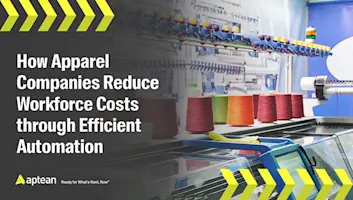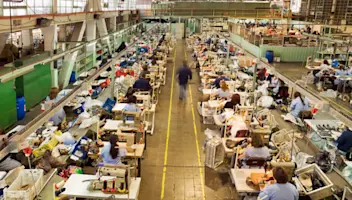Unlock Workforce Savings and Efficiency Through Automation in the Fashion and Apparel Industry
Unlock Workforce Savings and Efficiency Through Automation in the Fashion and Apparel Industry
Unlock Workforce Savings and Efficiency Through Automation in the Fashion and Apparel Industry
24 Apr 2023
Aptean Staff Writer
The fashion industry is facing workforce challenges, including staffing shortages and inflation that is driving up labor costs. In the Aptean 2023 Fashion and Apparel Manufacturing Report, 42% of North American apparel manufacturers identified staffing and labor shortages as their top concern over the last 12 months.
Many fashion and apparel companies have found success in mitigating workforce challenges through automation which can increase efficiency—helping companies reduce labor costs and meet consumer demands. To help apparel companies further discover the benefits of automation for workforce productivity, we’ve released a new eBook: Are You Getting the Best from Your Workforce?
Below, we share the four types of software for automation in the fashion industry that can deliver the biggest productivity gains for fashion and apparel companies. We also discuss the benefits of industry-specific automation for apparel design, production and customer fulfillment. Read the eBook for a deeper dive into the benefits of automation across every area of an apparel business.
Four Industry-Specific Solutions for Fashion and Apparel
For fashion and apparel companies seeking productivity gains to help overcome staffing challenges, Aptean recommends four integrated solutions specifically designed for the apparel industry:
Enterprise Resource Planning (ERP) serves as the business management hub across the organization, centralizing business data, standardizing processes and improving financial control.
Shop Floor Control (SFC) streamlines shop floor processes by tracking, scheduling and reporting on labor productivity and product manufacturing, assembling and processing.
Product Lifecycle Management (PLM) streamlines product design and development to help companies get to market more quickly.
Electronic Data Interchange (EDI) automates the exchange of transactional data between companies and their suppliers and customers.
McKinsey & Company predicts companies that adopt digitally enabled value chain solutions could see a 50% reduction in time to market and a 20% decline in manufacturing costs.
ERP and EDI Help Optimize Fulfillment to Satisfy Customers
An ERP helps apparel companies manage inventory and fulfill customer orders efficiently, providing real-time visibility into stock levels and automating key warehouse tasks. Fashion companies can draw additional benefits from a style-based ERP with kitting and multi-retailer same SKU production functionality. The ERP reserves product in the correct sizes, styles and colors, and warehouse automation directs picking, packing and shipping operations for greater efficiency. As each shipment is made ready, the ERP is updated and EDI automation creates shipping labels and an advanced shipping notice for the customer.
Shop Floor Control Enhances Visibility to Rev Up Production
Shop floor control automation helps apparel companies ensure better management visibility, boost worker productivity and incentivize performance:
Shop floor control provides management with improved visibility that can help detect errors during the production process, such as defects and deviations from product specifications or bottlenecks forming. By catching problems earlier, managers can troubleshoot and adhere to production schedules.
Real-time feedback workers receive about their productivity levels and performance can help to improve worker engagement. Shop floor automation also eliminates paper gum sheets in favor of handheld scanners to save time and improve accuracy.
With a shop floor control solution, companies can automate performance pay, tracking each worker's production and applying incentive pay rates.
Read the eBook for more details about labor cost savings and worker reallocation made possible by shop floor control and ERP.
PLM Supports Creativity While Boosting Efficiency in Design
Apparel companies face challenges managing multiple designs, lines and vendors while keeping pace with evolving fashion tastes and customer demands. A cloud-based PLM can help streamline the design and development of new fashion and apparel products, enabling an existing design team to operate with greater efficiency and effectiveness. It organizes workflows and approvals, centralizes the design library, automates advanced tech pack development and enhances collaboration with vendors.
Once new designs become finalized, integration between the PLM and ERP systems ensures the new products are set up in the system of record and ready to accept sales and start production. Download the eBook to discover real-world examples of the efficiency gains associated with integrated automation solutions.
End-to-End Apparel Automation Drives Workforce Efficiency Across the Business
Automation in the fashion industry can help mitigate staffing shortages, improve workforce utilization and contain labor costs through higher efficiency. Integrated ERP, SFC, PLM and EDI drive efficiency by optimizing workflows, communication and processes within fashion and apparel companies. This results in the same workforce having the ability to produce more orders and freeing up financial resources that management can use to drive new product development and business expansion.
Automating the design, production and fulfillment processes can help companies to improve their speed of delivery, reduce error rates and optimize productivity. Of course, end-to-end automation streamlines many additional business processes beyond these business areas.
Read the eBook for additional information about the workforce efficiency gains made possible in sales order processing, demand forecasting, materials purchasing, inventory management, omnichannel fulfillment, financial analysis and decision-making.
Looking for more information about how automation in the fashion industry can help optimize workforce utilization? Download Aptean’s eBook, Are You Getting the Best from Your Workforce?
Related Content


Ready to transform your fashion and apparel business today?
If you’re ready to take the next step, we’d love to help.






